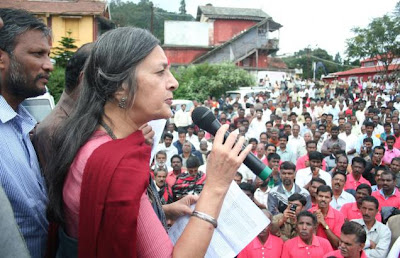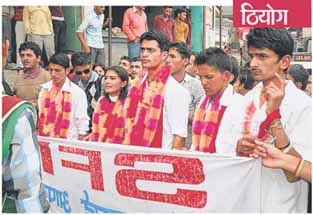Lokpal: For An Effective Anti-Corruption Body
Introduction
Corruption has become a major public concern in the wake of successive scams unfolding over the past few years. In a country like India, where millions of people still suffer from acute poverty, hunger and lack of socio-economic opportunities, the pillage of public resources through corruption amounts to a crime of a very serious nature. Besides impeding economic development, accumulation of ill gotten wealth through corruption is widening the inequalities and ruining the moral fabric of our society.
The recent exposures in the 2G spectrum allocation case, CWG scam etc. have shown how thousands of crores worth of public resources have been illicitly cornered by a section of corporates, bureaucrats and ministers. What is worse, tainted ministers have been allowed to remain in office for months and the investigations manipulated, in order to obstruct the course of justice. While corruption in high places has been a feature of our political system for many decades, what has emerged as a dominant trend in the post-liberalization period is a thorough distortion of the policy-making process at the highest levels of the government. A nexus of big corporates, politicians and bureaucrats have matured under the neoliberal regime and is threatening to subvert our democracy. It is clear that the current economic regime has made our system more vulnerable to cronyism and criminality.
The battle against corruption, in order to be effective today, can be achieved only through a comprehensive reform of our political, legal, administrative and judicial systems and not through one-off or piece-meal measures. The establishment of an effective Lokpal institution is one such measure. This needs to be complemented by other measures. There has to be a grievance redressal set-up for citizens, based on a legislation. There has to be a National Judicial Commission to oversee the higher judiciary; there has to be electoral reforms to check the use of money power in elections which is another source of corruption. Urgent steps also need to be undertaken to reform our tax system to plug loopholes and unearth black money, much of which is stashed in offshore bank accounts and tax havens. Firm steps need to be taken to break the big business-politician-bureaucrat nexus. Only a comprehensive systemic reform can effectively curb corruption.
Lokpal Bill
The institution of Ombudsman, which exists in many countries across the world, has provided avenues to redress public grievances on corruption and abuse of public office. However, the fact that the Lokpal Bill could not be passed in the Indian parliament in four decades exposes the lack of political will to fight corruption. Several governments in the past have taken it up only to shelve it later under various pretexts. The present government has also been compelled to initiate discussion on this bill because of public outcry over successive corruption scandals. It is imperative that a Lokpal Bill which deals with corruption in high places is tabled in the forthcoming session of parliament.
In the wake of the on-going debate on what should be the scope and role of the Lokpal, the Communist Party of India (Marxist) wishes to set out its stand on the main issues concerning the constitution of a Lokpal.
1. Definition of Corruption
Corruption involves a whole range of activities from bribery, influence peddling, patronage or favour, nepotism, cronyism, electoral fraud, embezzlement, kickbacks to officials and involvement in organized crime.
The Prevention of Corruption Act, 1988 has defined the offences that constitute a corrupt act. This definition requires to be widened. The linkage between misuse of public power for private gain or enrichment is a highly restrictive understanding of corruption. In many cases, power is misused to benefit an entity like a private company which is not a “person” as required under the PCA 1988. Often, there may be no traceable kickbacks or embezzlement but there may be a huge loss to the public exchequer and breach of public trust for example through sale of PSUs due to a willful misuse of power.
The definition of corruption has to be widened to include “willfully giving any undue benefit to any person or entity or obtaining any undue benefit from any public servant in violation of laws or rules”.
2. Clarity on Functions
The Lokpal should essentially be a fact-finding body that receives complaints, enquires, investigates and forward cases to Special Courts where prima facie there is a case of corruption for prosecution and punishment in a time bound manner. It should have powers to recommend an enquiry and investigation suo moto. It should oversee the entire machinery related to corruption cases at the Central level. Finally, it should have the powers to recommend executive action and to approach Courts when these are not accepted.
The Lokpal should be entrusted with quasi-judicial powers and autonomy to fulfill these functions in an independent, accountable, transparent and time-bound manner.
The separation of powers between legislature, executive and judiciary is a part of the basic structure of the Constitution. The institution of Lokpal should conform to this basic structure.
An issue to be considered regarding the functions of a Lokpal is whether it will deal with corruption or will it also perform functions of grievance redressal. The CPI(M) favours separation of these functions. There must be a separate mechanism for grievance redressal. This should be set up by a separate legislation. The grievances of citizens about the citizens charter etc should be brought under this set up.
3. Selection & Composition of Lokpal
The Lokpal Act should lay down an objective and transparent criteria such as competence, experience, qualification etc for the selection of candidates for appointment to the Lokpal. The selection committee should be broad-based consisting of members of the executive, leaders of parliament, members of the higher judiciary, jurists and academicians. The search committee constituted by the selection committee should also be broad-based.
Composition: Apart from the chairperson, there should be 10 members in the Lokpal. Out of these four shall be judicial members, three can be persons with administrative and civil service backgrounds and the other three should be drawn from fields such as law, academics and social service. There should be no member drawn from commerce and industries just as there can be no politician.
4. Jurisdiction
While corruption in high places has to be tackled on a priority basis, for the ordinary citizen, it is the corruption faced by them in daily life and in dealings with public authorities that also needs to be urgently taken up. Much of this sphere of corruption falls in dealings with authorities at the states-level. The Lok Ayuktas set up on the lines of the Lokpal should bring all state government employees, local bodies and the state corporations under their purview. Further, a citizen’s grievances redressal machinery that we have proposed be set up separately, should address all grievances regarding delivery of basic services and entitlements for citizens.
a) Prime Minister: The Prime Minister should be brought under the purview of the Lokpal with adequate safeguards. The office of Prime Minister along with all public servants was brought under the purview of Lokpal by the V.P. Singh Government in 1989 and in all subsequent draft legislations, the Prime Minister has been placed under the Lokpal. In fact a Parliamentary Standing Committee headed by Shri Pranab Mukherjee had made precisely this point while examining the 2001 Lokpal Bill. For the first time since 1989, this government presiding over a large number of scams, is unwilling to ensure accountability of the highest executive office. Clearly, all public servants of the Union Government within the definition in the Prevention of Corruption Act, which includes the Prime Minister, must fall within the purview of the Lokpal.
b) Judiciary: The judiciary too needs to be brought under scrutiny and made more accountable, and the stringent requirement of prior permission and sanction from the Chief Justice to file FIRs and investigate corruption charges has resulted in a de facto immunity to them. But the proposals to bring them under Lokpal encroach upon the constitutionally guaranteed independence of the Supreme Court. If a mere allegation of mala fide is enough for the Lokpal to start an inquiry into the actions of judges, it may not allow judges to act without fear.
Complaints about corruption against the judges of the Supreme Court and the High Courts should be handled by a separate body, the National Judicial Commission. This Commission should take care of the appointments in the higher judiciary and oversee their conduct and enquire into the complaints of corruption. For this, necessary legislation will have to be passed. The Judicial Standards and Accountability Bill, 2010 is woefully inadequate for this purpose.
c) Members of Parliament: At present, the scrutiny of the conduct of Members of Parliament with regard to any corrupt practice is weak and unsatisfactory. For Members of Parliament, Article 105 of the Constitution provides protection with regard to freedom of speech and voting. The real issue is how to ensure that this freedom and protection does not extend to acts of corruption by Members of Parliament.
This can be done through an amendment to Article 105, on the lines recommended by the National Commission to Review the Working of the Constitution”.
Alternatively, if feasible, there can be legislation that if any Member of Parliament indulges in any act of corruption that motivates his or her action in Parliament (voting, speaking etc.), then this act falls within the purview of the Prevention of Corruption Act and the IPC.
5. Lok Ayuktas
In the states, Lok Ayuktas should be set up on the model of the Central Lokpal.
6. Protection of Whistleblowers
Whistleblowers must be protected in order to combat corruption. Monitoring and ensuring protection of whistleblowers can be a part of the mandate of Lokpal, but this needs a comprehensive statutory backing. The provisions of the Public Interest Disclosure (Protection of Information) Bill, 2010 needs to be strengthened and the bill enacted expeditiously.
7. Big Business-Public Servant Nexus
It is necessary to recognise that an important source of corruption since liberalisation stems from the corrupt nexus between big business and public servants. It is necessary for the Lokpal to have investigations in cases which involve business entities to recommend cancellation of licences, contracts, lease or agreements if it was obtained by corrupt means. The Lokpal should also have the power to recommend blacklisting companies from getting government contracts and licences. Similarly, if the beneficiary of an offence is a business entity, the Lokpal should have the power to recommend concrete steps to recover the loss caused to the public exchequer. The government should normally accept these recommendations and act upon it.
Conclusion
The CPI(M) holds that along with a law for setting up an independent Lokpal, simultaneous measures to strengthen the legal and administrative framework against corruption are required. These include:
(1) Setting up of a National Judicial Commission to bring the conduct of judiciary under its purview
(2) Law to protect citizens charter for redressal of public grievances
(3) Amendment of Article 105 of the Constitution to bring MPs under anti-corruption scrutiny
(4) Electoral reforms to check money power in elections
(5) Setting up of Lok Ayuktas in the states to cover all public servants at the state-level
(6) Steps to unearth black money and confiscate the funds illegally stashed away in tax havens.














